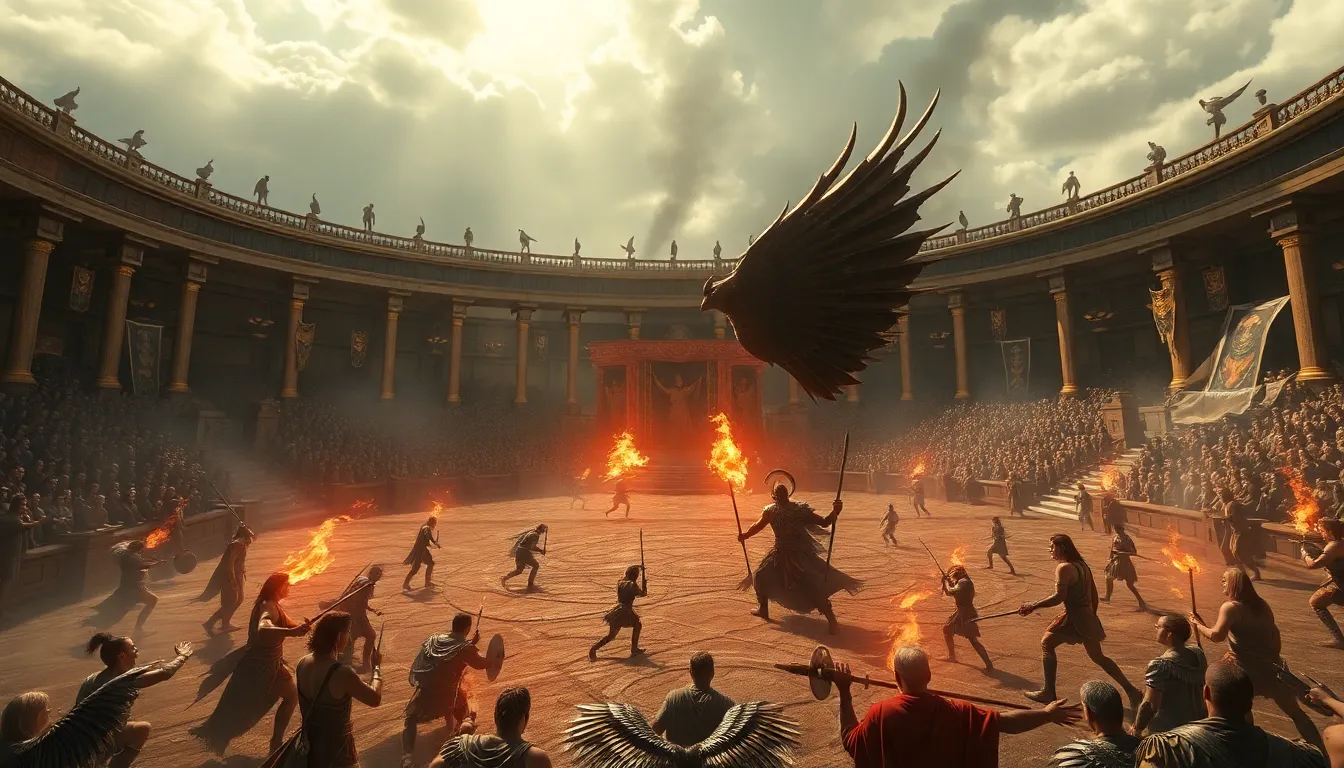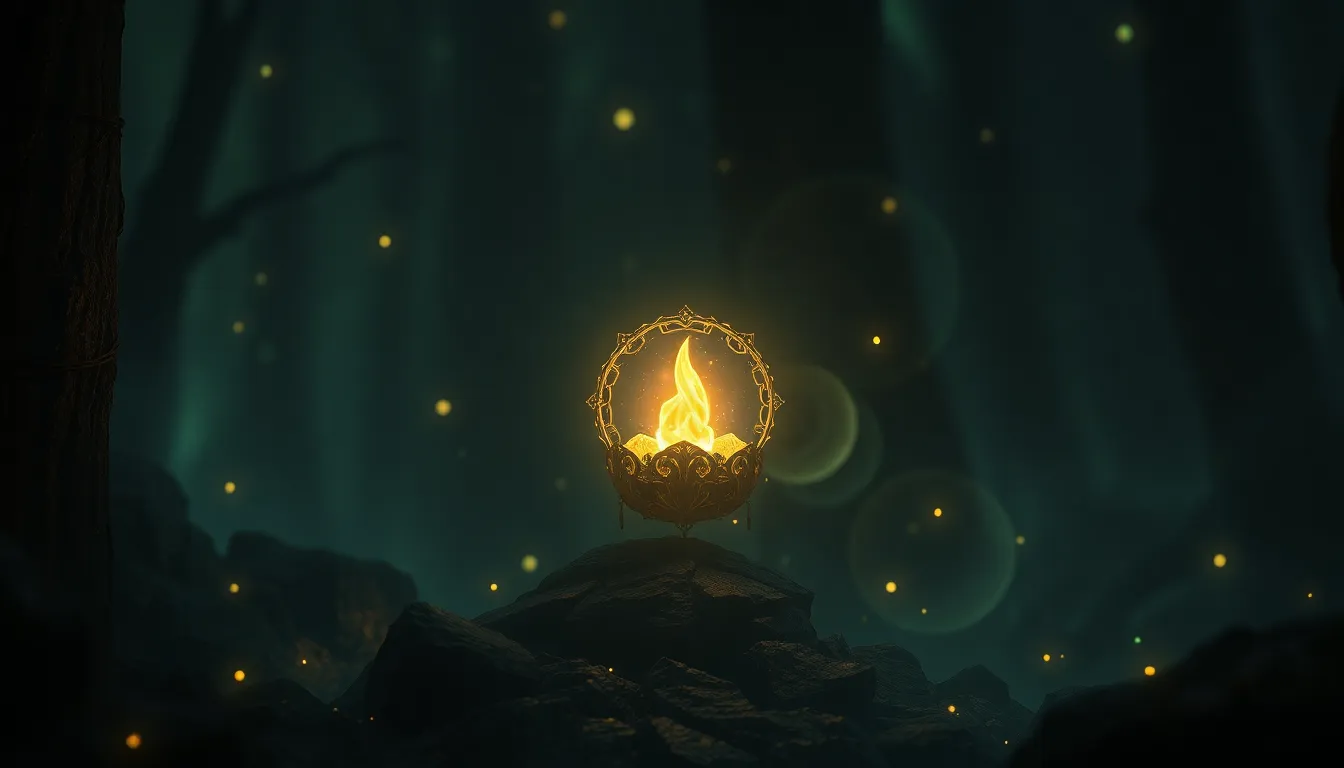The Arena of Legends: Unforgettable Mythological Battles
I. Introduction to Mythological Battles
Mythological battles are epic confrontations found in the folklore of various cultures, encompassing tales of heroism, conflict, and the struggle between good and evil. These battles often serve as pivotal moments in the narrative arcs of myths and legends, illustrating the values, fears, and aspirations of the societies that created them. This article explores legendary confrontations across different mythologies, highlighting the heroes and villains involved, the settings of these epic showdowns, and their lasting impact on culture and storytelling.
II. The Heroes and Villains: Key Figures in Mythology
At the heart of mythological battles are the key figures—heroes and villains—who engage in fierce conflicts that resonate through time. The following are notable examples:
A. Notable heroes
- Achilles: The Greek hero of the Trojan War, known for his near invincibility and tragic fate.
- Hercules: A demigod renowned for his strength and heroic feats, particularly the Twelve Labors.
- Thor: The Norse god of thunder, famed for his battles against giants and his legendary hammer, Mjolnir.
B. Iconic villains
- Loki: The trickster god in Norse mythology, known for creating chaos and leading to Ragnarok.
- Medusa: A Gorgon from Greek mythology whose gaze could turn men to stone, symbolizing danger and transformation.
- Hades: The god of the Underworld, often portrayed as a villain due to his role in the afterlife and the abduction of Persephone.
C. The role of gods and goddesses in shaping these figures
Gods and goddesses play crucial roles in shaping the destinies of both heroes and villains, often intervening in battles or setting the stage for conflicts. Their divine influence emphasizes the intertwining of fate and free will in these epic tales.
III. The Setting of the Arena: Mythological Landscapes
The landscapes where these mythological battles occur are as iconic as the figures involved. These settings not only serve as backdrops but also contribute significantly to the narrative of the conflicts.
A. Description of legendary battlegrounds
- Olympus: The home of the Greek gods, representing divine authority and power.
- Valhalla: A majestic hall in Norse mythology where heroes slain in battle are welcomed, symbolizing valor and honor.
- The Underworld: A realm of the dead in various mythologies, often a site for battles over souls and morality.
B. The significance of these locations in mythological narratives
These locations often reflect the values and beliefs of the cultures they originate from, with each site embodying unique themes such as honor, sacrifice, and fate.
C. How environmental factors influence battles
Environmental elements, such as weather, terrain, and supernatural phenomena, play critical roles in shaping the outcomes of battles, adding an additional layer of complexity to the narratives.
IV. Iconic Battles Across Cultures
Throughout history, various mythologies have portrayed epic battles that reflect their cultural ethos. Here are some iconic examples:
A. Greek Mythology: The Trojan War
The Trojan War, a decade-long siege, features legendary heroes like Achilles and Hector battling for the fate of Troy, illustrating themes of love, honor, and tragedy.
B. Norse Mythology: Ragnarok
Ragnarok is the prophesied end of the world, a climactic battle between gods and giants, showcasing the inevitable cycle of destruction and rebirth.
C. Hindu Mythology: The Mahabharata War
This epic conflict between the Pandavas and Kauravas explores deep moral dilemmas, duty, and the complexities of dharma (righteousness).
D. Egyptian Mythology: The Battle of Set and Horus
The battle between Set, the god of chaos, and Horus, the god of order, symbolizes the struggle between good and evil, reflecting the ancient Egyptians’ worldview.
V. Tactics and Weapons of the Gods
The heroes and villains of mythology are often equipped with extraordinary weapons and employ strategic tactics in their battles.
A. Overview of mythical weapons
- Excalibur: The legendary sword of King Arthur, symbolizing rightful sovereignty.
- Mjolnir: Thor’s hammer, capable of leveling mountains and summoning storms.
- The Trident: Poseidon’s weapon, representing dominion over the sea.
B. Strategic approaches taken by heroes and villains
Heroes often rely on bravery and honor, while villains may use deceit and cunning, leading to dynamic and unpredictable outcomes in battles.
C. The impact of divine intervention in battles
Interventions by gods can turn the tide of battle, illustrating the belief that the divine realm is deeply intertwined with human affairs.
VI. Themes of Honor and Valor in Mythological Conflicts
Mythological battles are rich with themes that resonate with human experience:
A. The concept of honor among warriors
Honor is a central theme, with warriors often fighting not just for victory, but for their names and legacies.
B. The dichotomy of good vs. evil in battles
Many mythological conflicts embody the struggle between good and evil, reflecting moral lessons and societal values.
C. Personal growth and the hero’s journey
Heroes often undergo significant personal transformations through their battles, embodying the classic hero’s journey.
VII. The Aftermath: Consequences of Mythological Battles
The aftermath of these battles has profound implications for gods, heroes, and humanity.
A. The impact on gods, humans, and the world
Defeats and victories shape the fate of entire civilizations, influencing cultural narratives and religious practices.
B. Lessons learned from the battles
These stories often impart moral lessons about bravery, sacrifice, and the complexities of human nature.
C. Lasting legacies and cultural influences
The legacies of these battles continue to influence art, literature, and modern storytelling.
VIII. Adaptations and Representations in Modern Media
Mythological battles have inspired countless adaptations in various forms of media:
A. Literature: Epic poems and novels
Classic works like Homer’s “Iliad” and the “Mahabharata” remain influential, offering rich narratives for modern readers.
B. Film and television portrayals of mythological battles
Films such as “Troy” and TV series like “Game of Thrones” have brought these epic confrontations to life, captivating contemporary audiences.
C. Video games and interactive experiences
Video games like “God of War” allow players to engage directly with mythological narratives, providing immersive experiences.
IX. The Psychological and Cultural Relevance of Mythological Battles
Mythological battles reflect deep aspects of human nature and societal values:
A. How these stories reflect human nature and societal values
These narratives often mirror the struggles, aspirations, and fears of humanity, serving as a lens through which we can examine ourselves.
B. The



